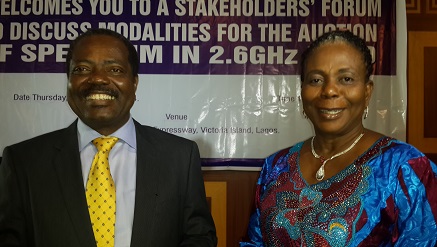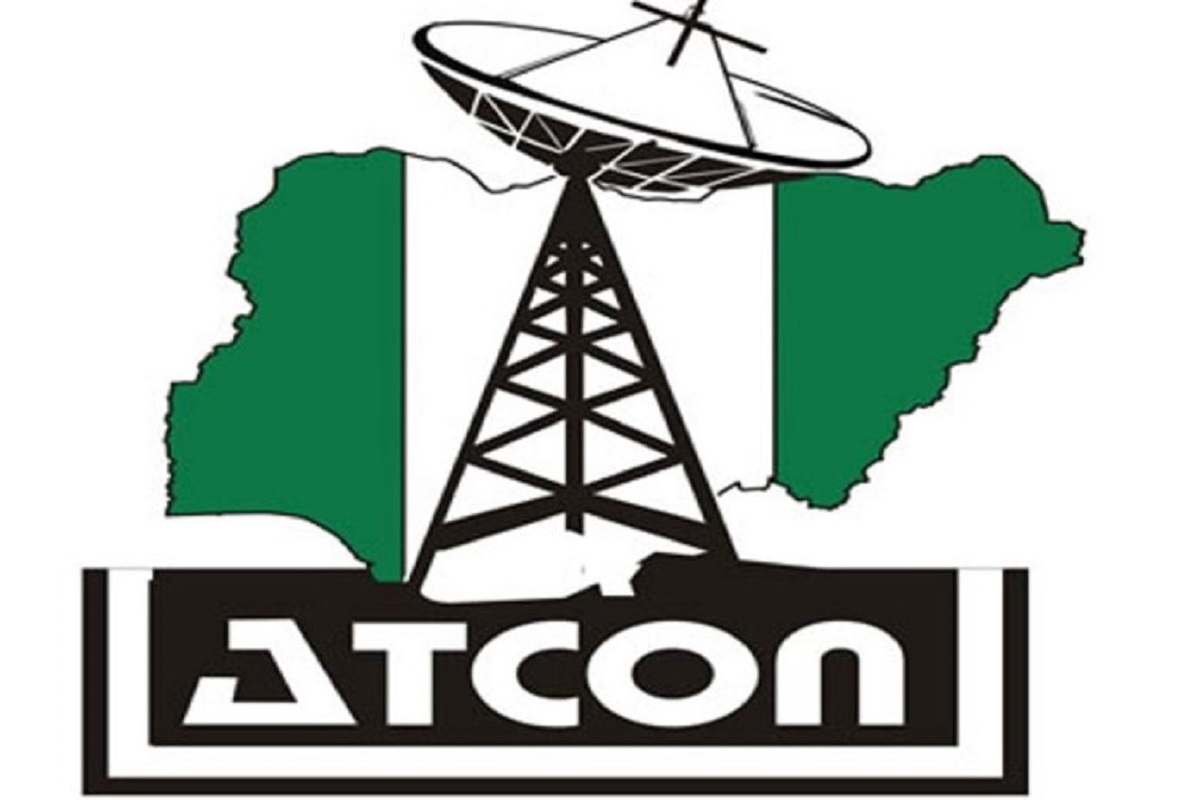Telecom
NCC, Stakeholders Dialogue on Best Spectrum Auction Model

Players in the telecommunications industry have tabled their positions hoping to influence the Nigeria Communications Commission (NCC) in the sale frequencies in the 2.6GHz Spectrum.
Arguments swung left and right but majorly for the maintenance of the present pattern of national licensing.
Another handful called for a regional licensing approach that will create room for more players and improved deployment phase.
Speaking at the Forum, Engineer Peter Igoh, chairman, Nigerian Communications Commission said that, the transparent way in which the Commission had conduct its licensing processes, including auctions, have been globally recognized.
He said, the Forum was part of NCC’s consultative disposition in which it strive to ensure inclusiveness in its decision-making processes, fairness and openness in dealings, and predictability in the nation’s telecom regulatory atmosphere.
On his part, Engineer Austin Nwaulune, director, Spectrum Administration at NCC, also said that the Commission has 2 x 70 MHz Slot in the 2.6GHz Band up for sale.
He said they were determined to put it up for the most qualified organizations to utilize them for the benefit of the nation.
Listing issues involved in the process such as the possibility of introducing spectrum caps, licensing options, tenures, roll out obligations and some key issues that the Commission’s auction committee may have put up for consideration, Nwaulune said the Commission’s transparent disposition in the ways and manners in which the auction will be conducted is not negotiable.
Engineer Lanre Ajayi, president, Association of Telecommunication Companies of Nigeria (ATCON), applauded the sense of seeking stakeholders’ views on the process but sought to know why close to 30 companies expressed interest during the sale of 2.3GHz band earlier in the year, but only two went ahead to bid.
He urged NCC to review the process, create changes for business viability.
According to him, most organizations might become skeptical about the bidding should NCC fail to declare its intentions on time, citing the sale of 2.6GHz few months after the 2.3GHz as unpalatable for ventures.
On the Modalities licencing model, Ajayi said he believes in Spectrum Trading, where a company with either a National or a Regional Licence can have the leverage of selling the same to another company without been queried by the NCC.
Nwaulune swiftly explained that spectrum trading might be unfavourable for the industry, as some companies could arm-twist others to get the licence, whereas the end-users bear the blunt.
But, Engineer Bayo Banjo, president, Nigeria Internet Group (NIG), has a different view, saying that the industry should learn from past experience that allocation of licences on National bases has not alleviated the broadband penetration challenges.
According to him, National frequency allocation has caused more harms than good, creating hiccups for organizations during deployment and recouping of investments hard to attain.
He opined that such practice can become viable if the bidders and eventual winners are meant to sign agreement to cover the 36 States and the FCT, and no redundancy in spectrum utilization in any of the States.
Nodding in agreement, Chidi Ibisi, chief marketing officer, Broadbased Communications, said that Regionalization of the licencing is the way forward, hence it will boost chances of local companies participation and help in building Companies, which has been the primary focus of Dr. (Mrs) Omobola Johnson, led Ministry of Communication Technology.
On his part, Mr. Aremu Olajide, head of Network Operations, Globacom, said that NCC should work towards ensuring that organizations with pedigree in spectrum administration are given opportunity to manage the scarce resources for the best interest of the nation’s broadband availability and affordability plans.
He urged NCC not to depart from the objectives of these programmes centered on deepening competition and improve broadband penetration in the Country.
Meanwhile, Igoh said that the Commission has commenced the processes for the selection of Infrastructure Companies for Lagos and North Central Region in line with the Open Access Model that was launched in 2014.
In due course, qualified companies will be selected in that process to give impetus to the drive to achieve robust deployment and service provisioning for broadband services across the country.
Telecom
ATCON Commends FG for $2Bn “Project Bridge”, Pledges Support

Association of Telecommunication Companies of Nigeria (ATCON) on Monday commended the Federal Ministry of Communication, Innovation, and Digital Economy (FMCIDE) for spearheading a new initiative known as ‘Project Bridge’.

Tony Emoekpere, president, ATCON, stated in an interview with NAN in Lagos that the initiative aimed to create a robust and resilient telecommunications backbone across Nigeria.
Emoekpere stated that the project was an ambitious public-private partnership designed to connect all 36 states and Abuja, as well as LGAs, via fiber optic cables.
According to him, the initiative is not meant to replace existing infrastructure but to complement it, creating a more resilient network.
“Right now, most of the networks that we have are linear in nature. ’Just imagine, if there’s only one road from Lagos to Ibadan; if anything happens to that road, you would not get to Ibadan.
‘’This project will create alternative routes,” he said.
The ATCON boss stated that the project was modeled after the successful PPP framework in the energy sector, with the government contributing a certain percentage to the Special Purpose Vehicle and the private sector providing the remaining funding.
He stated that the project’s goal was to establish alternative, redundant connections, thereby ensuring that services remained uninterrupted even if one part of the network was compromised.
The president expressed the full support of telcos, noting that the project would enable members to deliver services more effectively in locations where infrastructure was currently a significant challenge.
“With this project, we will have multiple options,” he said.
Project BRIDGE involves building a nationwide fiber optic network to expand digital infrastructure and connectivity, rather than a physical bridge, as part of Nigeria’s National Broadband Plan.
The project is a public-private partnership ($2 billion cost) using an SPV to deploy 90,000km of fiber-optic cable to enhance education, healthcare, and the digital economy.
Telecom
MTN Restores Services After Planned Network Maintenance in Parts of Adamawa, Borno, and Kano

MTN Nigeria has successfully completed a scheduled network maintenance operation that affected 101 sites across 15 Local Government Areas (LGAs) in Adamawa, Borno, and Kano States.

The restoration marks a significant step in the company’s ongoing efforts to enhance service reliability in the Northeast region, amidst multiple fibre cuts and vandalism.
The maintenance, which took place on Sunday, August 24, involved the cutover of traffic to a newly installed fiber span along the AFCOT–Bawo Village route in Adamawa State.
This upgrade was necessary to replace a previously damaged section of the network infrastructure. All service maintenance was done within timeframe and restorations before 1 PM on Sunday August 24th.
We can confirm that all impacted sites have been fully restored, and services are now operating normally. We appreciate our subscribers’ patience and sincerely apologize for any inconvenience caused during the downtime.
The affected services included 2G, 3G, 4G, and enterprise connectivity, with temporary disruptions experienced in LGAs such as Girei, Song, Mubi North, Hong, and Michika in Adamawa; Askira/Uba and Shani in Borno; and Nasarawa in Kano.
The work was scheduled during daylight hours to ensure the safety of field engineers, given the linear and unprotected nature of the route.
This restoration is part of MTN’s broader strategy to strengthen its infrastructure in underserved regions and ensure consistent service delivery across Nigeria, amidst constant fibre cuts and vandalism.
Telecom
TikTok Unveils Artist Insights Platform in Nigeria

TikTok has launched its music insights platform, TikTok for Artists, in Nigeria to support artist growth and fan engagement across the country’s vibrant music industry.

The platform, which debuted globally earlier this year, provides artists, labels, and management teams with access to daily-updated dashboards and analytics tools to track music performance, audience demographics, and fan interactions.
Toyin Mustapha, Head of Music Partnerships for the UK, Ireland, and Sub-Saharan Africa at TikTok, said the initiative was part of the company’s commitment to empowering African creators.
“With the launch of TikTok for Artists in Nigeria, we’re giving artists and their teams access to insights that can help them engage their fans in more meaningful ways and grow their careers globally,” Mustapha said.
The platform offers detailed song performance metrics, including views, posts, and creator engagements per track. It also provides granular post-level data such as likes, comments, shares, and completion rates, alongside demographic breakdowns by gender, age, and language.
In addition to analytics, TikTok for Artists includes educational resources and step-by-step guides to help artists build sustainable careers.
A key feature of the platform is the Pre-Release tool, which allows artists to launch campaigns for upcoming albums and enables fans to pre-save tracks on streaming platforms like Spotify and Apple Music.
British artist Jordan Adetunji described the platform as a “game changer,” noting its value in helping artists and their teams plan effective campaigns.
TikTok said the rollout reaffirms its investment in Africa’s creative economy and aims to foster deeper connections between artists and fans across the continent.
The platform is now available to all certified TikTok Artist Accounts, with access also extendable to managers and label teams.

 E-Business2 days ago
E-Business2 days agoNDPC Begins Probe of Banks, Others for Data Breaches

 E-Financial2 days ago
E-Financial2 days agoFBNQuest Merchant Bank Facilitates Landmark ₦5Bn Commercial Paper Programme for Accion Microfinance Bank

 Telecom2 days ago
Telecom2 days agoDigital Realty Commits to Africa’s Digital Transformation @ Launch of LKK2 Data Center

 Telecom2 days ago
Telecom2 days agoIntel–U.S. Partnership Reshapes Semiconductor Landscape with Historic Equity Agreement

 E-Financial2 days ago
E-Financial2 days agoUBA to Deepen Financial Inclusion, Boost Savings’ Culture with Super Savers’ Promo

 E-Financial2 days ago
E-Financial2 days agoNigeria Leads Africa in Stablecoin Adoption with $22Bn in Transactions

 E-Financial2 days ago
E-Financial2 days agoFidelity Bank Resumes Intl Transactions on Naira Debit Cards

 Telecom2 days ago
Telecom2 days agoNITDA Alerts Nigerians to eSIM Security Flaw Deployed to Hijack Devices Worldwide
























